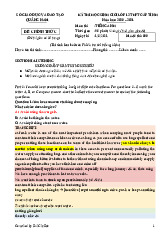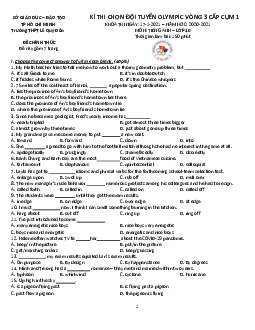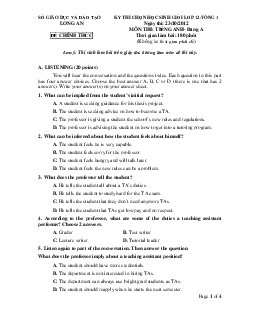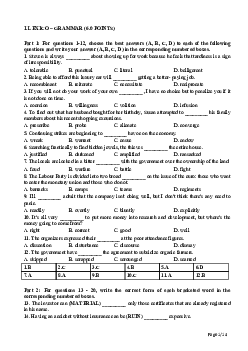





Preview text:
SỞ GD&ĐT
KÌ THI CHỌN HSG TỈNH NĂM HỌC 2017-2018
QUẢNG BÌNH Khoá ngày 22 tháng 3 năm 2018 Môn thi: TIẾNG ANH
ĐỀ THI CHÍNH THỨC LỚP 12 THPT
Thời gian làm bài: 180 phút (không kể thời gian giao đề)
Họ và tên:..................................... (Đề thi này có 06 trang)
Số báo danh:................................
Lưu ý: * Thí sinh làm bài vào tờ giấy thi.
* Thí sinh không được sử dụng tài liệu, kể cả từ điển.
* Giám thị không trao đổi, giải thích gì thêm. SECTION ONE: LISTENING
* Bài nghe gồm 2 phần, mỗi phần được ghi âm 2 lần. Giữa 2 lần ghi âm của mỗi phần và giữa
các phần có một khoảng thời gian chờ.
Part 1: Listen to the description on a new-opening local sports shop and fill the gaps in the
summary below with ONE WORD AND/OR A NUMBER. (9pts) SPORTS WORLD
* a new (1) ....................... of an international sports goods company
* located in the shopping center to the (2) .................. of Bradcaster
* is the (3) ....................... in sports retailing
* has been given a new minimalist look with the company’s (4) ................. colors
* has a huge range of sports (5) ................... as well as equipment on floors 1 - 3
* a cafe and a book and DVD (6) ................... on the top floor
* can get you any item within (7) .................... days
* focus on (8) ....................
* has a special section which just sells (9)....................
Part 2: Listen to the conversation about Latin American Studies and choose the best answers among A, B, or C. (6pts)
10. Paul decided to get work experience in South American because he wanted ______ A. to teach English there B. to improve his Spanish
C. to learn about Latin American life
11. What project work Paul originally intends to get involved in? A. construction B. agriculture C. tourism
12. Why did Paul change from one project to another?
A. His first job was not well organized. B. He found doing the routine work very boring.
C. The work was too physically demanding.
13. In the village community, he leant how important it was to______ A. respect family life. B. develop trust C. use money wisely.
14. What does the Paul say about his project manager?
A. He let Paul do most of the work
B. His plans were too ambitious.
C. He was very supportive of Paul.
15. Paul was surprised to be given _______ A. a computer to use
B. so little money to live on C. an extension to his contract SECTION TWO: PHONETICS
Part 1. Pick up the word whose underlined part is pronounced differently from the others. (3pts) 16. A. resort B. position C. pleasure D. desert 17. A. educate B. eliminate C. appropriate D. complicate 18. A. sweet B. sword C. answer D. whole
Part 2. Choose the word whose main stress is placed differently from the others in each group. (2pts) 19. A. enthusiasm B. development C. athletic D. politics 20. A. majority B. ceremony C. astronomy D. democracy Page 1/6
SECTION THREE: LEXICO - GRAMMAR
Part 1. Choose the word or phrase (A, B, C or D) which best completes each sentence. (10pts)
21. Look! The yard is wet. It last night.
A. must have rained B. couldn't have rained C. must rain D. should have rained 22. Last year she earned her brother.
A. twice as much as B. twice more than C. twice as many as D. more twice than
23. Just keep __________ on the baby while I cook the supper, will you? A. a look B. a glance C. an eye D. a care
24. ____________ from anything else, she is always late for work. A. Not only B. Apart C. As well D. Except
25. Women’s participation __________ in the workforce was lower in the countries which had less developed economies. A. scale B. speed C. velocity D. rate
26. From time to time he ……………himself to a weekend in a five-star hotel. A. craves B. indulges C. treats D. benefits
27. Men still expect their jobs to take _________. A. superiority B. imposition C. priority D. seniority
28. According to a recent survey, most people are on good ________ with their neighbors. A. terms B. relations C. relationships D. acquaintance
29. The police finally arrested the _________ criminal. A. famous B. renowned C. respectable D. notorious
30. Peter: “Do you mind my taking this seat?” Jean: “_________” A. Yes, sit down please. B. No, of course not. C. Yes, take it please. D. No, you can’t take it.
Part 2. Read the text below. Use the words given in capitals at the end of each line to form a
word that fits in the space in the same line. There is an example at the beginning (10pts) TRANSLATION WORK
Usually, ...(0) professional... translators work from a foreign language (0) PROFESSION
into their mother tongue to reduce……(31)…… translation and for better 31. ACCURACY
style. Much translation is of ………(32)…… or commercial material and 32. SCIENCE
this kind of work often requires an ……(33)…… of technical vocabulary 33. UNDERSTAND
and ……(34)…...... language. 34. SPECIAL
Not all translators are in full-time ……(35)……… but those who are 35. UNEMPLOYED
usually work for large ………(36)........ concerns or for public organisations. 36. INDUSTRY
The main personal characteristic needed to be a …...(37)...... translator 37. SUCCEED
is a …….(38)........ to attend to detail. In addition, in translation work, it is 38. WILLING
……(39)........ for translator to know at least two foreign languages. The 39. DESIRE
wider the ……(40)....... of languages they can offer, the greater the 40. VARY
likelihood that work will be available.
Part 3. Put the verbs given in brackets into the appropriate tenses or forms. (5pts)
41. It rained, which spoils our picnic; but provided that it (not rain)_________, our picnic would be great success.
42. Can you be at the station to meet us? We (travel) ________ on the 10 a.m. train, which will arrive in Edinburgh at 15.30.
43. John was nearly exhausted because he (punish) ________ all day.
44. Mr. David teaches us philosophy, but today Ms. Taylor (do) _________that.
45. He spoke and behaved as if he had got our group (serve) _________ his family. Page 2/6
Part 4. In each of the following sentences, the four words or phrases are marked A,B,C or D.
IDENTIFY the one underlined expression that is not correct and CORRECT it. There is an
example at the beginning (0). (5pts)
0. We all know that we have to work hardly to earn a living ourselves and support the family. A B C D
(0). B hardly → hard
46. I think she will be suitable for the work because she has been working like a teacher for a long time. A B C D
47. Air pollution, together with poisonous chemicals, are causing problems in our large, industrial cities today. A B C D
48. My sister told me that she had met my teacher at the supermarket yesterday. A B C D
49. A.Earhart, the first woman flying solo across the Atlantic, disappeared in 1937 while attempting to fly around the world. A B C D
50. It was so a fine day that we decided to go for a picnic. A B C D
Part 5. Fill in each of the blanks with ONE suitable preposition or particle (5pts)
51. I have seen that famous actor on television, but I have never seen him _______ person.
52. You have to move this box to make room _______ the new television set.
53. How about taking a shower instead ________ having a bath to save water?
54. The dog went _______ him and knocked him down.
55. Watch out! The building is ______ construction and unidentified objects are falling down.
SECTION FOUR: READING COMPREHENSION
Part 1. Choose the word that best fits each of the blanks in the following passage. Choose A, B, C
or D to indicate your answer. (10pts) BLOGS
One rather unlikely word that has recently entered the language is “blog”, a shortened form of “web
log”. A blog is a diary (56) ______ on the Internet by the person writing it- the “blogger”- who
presumably (57) ______other people to read it. It is ironical that modern technology is being used to
(58) ______ new life into such an old – fashioned form as the personal journal. And now, as the
technology behind video cameras is making them easier to use, we have the video log, or “vlog”.
Vlogging does not require (59)______ sophisticated equipment: a digital video camera, a high-speed
Internet connection and a host are all that it needed. Vloggers can put anything that (60) ______ their
fancy onto their personal web site. Some vloggers have no ambitions (61)______ than to show films
they have shot while on holiday in exotic places. However, vlogs can also (62)______ more ambitious
purposes. For instance, amateur film-makers who want to make a (63)______ for themselves might
publish their work on the Internet, eager to receive advice or criticism. And increasingly, vlogs are
being used to (64)______ political and social issues that are not newsworthy enough to (65) ______ Page 3/6
coverage by the mass media. It is still too early to predict whether vlogging will ever show off in a
major way or if it is just a passing fad, but its potential is only now becoming apparent. 56. A. released B. sent C. posted D. mounted 57. A. believes B. expects C. assumes D. supposes 58. A. add B. inhale C. insert D. breathe 59. A. absolutely B. largely C. utterly D. highly 60. A. grasps B. appeals C. takes D. gives 61. A. except B. apart C. rather D. other 62. A. serve B. employ C. function D. play 63. A. publicity B. fame C. name D. promotion 64. A. emphasizes B. publicize C. distribute D. circulate 65. A. earn B. warrant C. excuse D. cause
Part 2. Read the text below and think of the word which best fits each gap. Use only ONE word in each gap. (10pts) INTUITION
Sometimes you just know things about people the first time you see them - for example that
you want to be friends with them or that you don’t trust them. But perhaps this kind of intuition isn’t as
hard to explain (66) ________ it may seem. For instance, everybody gives out body language signals
all the time. The (67) ________ you hold your body, head and arms tells people about your mood. If
you hold your arms tightly at your sides (68) ________ fold them across your chest, people will
generally feel that you are being defensive. Holding your head on one side shows interest in the (69)
_________ person, while (70) _________ relaxed, “open” posture indicates that you are self-
confident. All this affects (71) _________ we feel about someone.
Also, a stranger may remind you of a previous meeting with someone. This may be because of
(72) _________ as simple as the fact that he or she is physically similar (73) _________ someone who
treated you well or badly. But your reaction doesn’t have to be the result of the memory of a person
you previously met - your feelings about the stranger could be influenced by a smell in the air that
brings to mind a place (74) _________ you were happy as a child. Since even a single word can bring
back a memory (75) _________ as that, you may never realize it is happening.
Part 3. You are going to read a magazine article about human skin. The passage has 10
paragraphs A–J. Which paragraph contains the following information (76-80) of the article?
Answer the questions below by writing the correct letters, A-J, on your answer sheet. There is an
example at the beginning (0). (5pts) HUMAN SKIN A
If you took off your skin and laid it flat, it would cover an area of about twenty-one square feet,
making it by far the body's largest organ. Draped in place over our bodies, skin forms the barrier
between what's inside us and what's outside. It protects us from a multitude of external forces. It serves
as an avenue to our most intimate physical and psychological selves. B
This impervious yet permeable barrier, less than a millimeter thick in places, is composed of three
layers. The outermost layer is the bloodless epidermis. The dermis includes collagen, elastin, and nerve
endings. The innermost layer, subcutaneous fat, contains tissue that acts as an energy source, cushion and insulator for the body. C
From these familiar characteristics of skin emerge the profound mysteries of touch, arguably our most
essential source of sensory stimulation. We can live without seeing or hearing – in fact, without any of
our other senses. But babies born without effective nerve connections between skin and brain can fail to thrive and may even die. Page 4/6 D
Laboratory experiments decades ago, now considered unethical and inhumane, kept baby monkeys
from being touched by their mothers. It made no difference that the babies could see, hear and smell
their mothers; without touching, the babies became apathetic, and failed to progress. E
For humans, insufficient touching in early years can have lifelong results. "In touching cultures, adult
aggression is low, whereas in cultures where touch is limited, adult aggression is high," writes Tiffany
Field, director of the Touch Research Institutes at the University of Miami School of Medicine.
Studies of a variety of cultures show a correspondence between high rates of physical affection in
childhood and low rates of adult physical violence. F
While the effects of touching are easy to understand, the mechanics of it are less so. "Your skin has
millions of nerve cells of various shapes at different depths," explains Stanley Bolanowski, a
neuroscientist and associate director of the Institute for Sensory Research at Syracuse University.
"When the nerve cells are stimulated, physical energy is transformed into energy used by the nervous
system and passed from the skin to the spinal cord and brain. It's called transduction, and no one
knows exactly how it takes place." Suffice it to say that the process involves the intricate, split-second
operation of a complex system of signals between neurons in the skin and brain. G
This is starting to sound very confusing until Bolanowski says: "In simple terms people perceive three
basic things via skin: pressure, temperature, and pain." And then I'm sure he's wrong. "When I get wet,
my skin feels wet," I protest. "Close your eyes and lean back," says Bolanowski. H
Something cold and wet is on my forehead – so wet, in fact, that I wait for water to start dripping down
my cheeks. "Open your eyes." Bolanowski says, showing me that the sensation comes from a chilled,
but dry, metal cylinder. The combination of pressure and cold, he explains, is what makes my skin
perceive wetness. He gives me a surgical glove to put on and has me put a finger in a glass of cold
water. My finger feels wet, even though I have visual proof that it's not touching water. My skin,
which seemed so reliable, has been deceiving me my entire life. When I shower or wash my hands, I
now realize, my skin feels pressure and temperature. It's my brain that says I feel wet. I
Perceptions of pressure, temperature and pain manifest themselves in many different ways. Gentle
stimulation of pressure receptors can result in ticklishness; gentle stimulation of pain receptors, in
itching. Both sensations arise from a neurological transmission, not from something that physically
exists. Skin, I'm realizing, is under constant assault, both from within the body and from forces
outside. Repairs occur with varying success. J
Take the spot where I nicked myself with a knife while slicing fruit. I have a crusty scab surrounded by
pink tissue about a quarter inch long on my right palm. Under the scab, epidermal cells are migrating
into the wound to close it up. When the process is complete, the scab will fall off to reveal new
epidermis. It's only been a few days, but my little self-repair is almost complete. Likewise, we recover
quickly from slight burns. If you ever happen to touch a hot burner, just put your finger in cold water.
The chances are you will have no blister, little pain and no scar. Severe burns, though, are a different matter. INFORMATION PARAGRAPH
Example: (0) human skin - the unbelievable and important body part A
76) the features of human skin, on and below the surface
77) an experiment in which the writer can see what is happening
78) advice on how you can avoid damage to the skin
79) cruel research methods used in the past 80) the mechanics of touching Page 5/6 SECTION FIVE: WRITING
Part 1. Finish each of the following sentences in such a way that it means exactly the same as the
sentence printed before it. (5pts)
81. I’m sure she didn’t do it on purpose.
→ She can’t ………..........................……………………
82. We left quietly, so that we wouldn’t disturb the children.
→ So as ……………….....………………………………
83. The patient recovered more rapidly than expected.
→ The patient made ……................……………………..
84. It was his over-confidence that led to his defeat in the Way to Olympia.
→ If he …….………………...........…………………………..
85. He got down to writing the letter as soon as he returned from his walk.
→ No sooner …….…………...........……………..........................
Part 2. Complete the second sentence so that it has a similar meaning to the first sentence using
the word given. DO NOT CHANGE THE WORD GIVEN. You must use between TWO and
FIVE WORDS, including the word given. (5pts)
86. What are you trying to say something? AT
→ What are you …. …................................................... something?
87. Graham stopped talking to deal with a customer. OFF
→ Graham …….….............................… to deal with a customer.
88. You can rely on Susan for help. COUNT
→ You can …….….................................………… Susan for help.
89. Let’s visit the museum this afternoon. GO
→ Why …….……......................…..... the museum this afternoon?
90. Valerie found it hard to concentrate on her book because of the noise. DIFFICULTY
→ Valerie …….……………….... on her book because of the noise.
Part 3. Essay writing. (10pts)
Teamwork offers a lot of benefits in the modern society.
To what extent do you agree or disagree?
Use specific reasons and examples to support your idea. You should write at least 200 words. ------THE END------ Page 6/6




